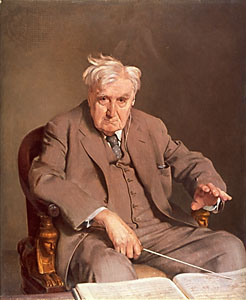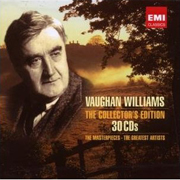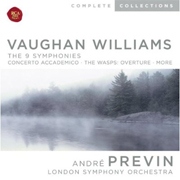
Don't Call Him Ralph
It's pronounced Rafe. Mispronouncing Ralph Vaughan Williams doesn't mark you as a hopeless peasant with the damning finality of, say, leaving out the "zhuh" sound in Dvorák or pronouncing the "h" in Beethoven, but nonetheless one must mind one's compositional p's and q's if one desires to maintain any semblance of a cred in the classical music biz.
(Yes, I know there's an accent over the 'r' in "Dvorák, but the examiner.com software turns it into a question mark.)
While we're on the subject, his last name was Vaughan Williams, not Williams. File him in the V section, not under the Ws.

Ralph Vaughan Williams
VW and I are having a delightful time these days thanks to EMI's "Vaughan Williams: The Collector's Edition", thirty CDs worth of authentic 20th-century English goodness. I add this to my already fat collection of VW stuff -- two sets of the symphonies, the opera "Sir John in Love", and a sprinkling of those EMI "British Composers" CDs featuring delights such as Job: A Masque for Dancing and The Lark Ascending.
And then there's Robert Tear singing the song cycle "On Wenlock Edge" with Simon Rattle and the City of Birmingham Symphony, one of my absolute, all-time favorites. It's included on the EMI Collector's Edition, although I already have it on a single.
Despite my Germanic last name, my ancestry is fairly solidly English and so I'm a sitting duck for British composers. I don't get all antsy around Delius or Butterworth the way my Continental-originating friends do; I'm just fine with the British propensity for long contemplation and a sense of pastoral calm. I'm primarily a tea-drinker and I make absolutely dandy scones.
Not bad for a guy who is nine, count 'em, nine generations removed from England, descended from prairie settlers on one side and Southerners (ranging from middle-class to pure white trash) on the other. Hell, we were even Episcopalian, a.k.a. Church of England, back when my parents were making a halfhearted attempt to incorporate some lip-service Christianity into our TV-and-tail-fins suburban lives.
Thus Vaughan Williams has always been a composer guaranteed to engage me at a downright abdominal level; I respond to him in many ways more strongly than to American moderns such as Copland.
For a lot of folks, VW's output consists of a few symphonies, the Fantasia on a Theme by Thomas Tallis, and perhaps the occasional choral piece, but that's about it. He was an extraordinarily broad writer, actually; his genres encompass orchestral, chamber, instrumental, vocal, choral, ballet, and opera. In a lot of ways he was a throwback to composers of the 18th century who could write in just about any genre; among his contemporaries, perhaps only Sibelius comes close to his range, but even that prolific Finn didn't come up with operas like VW's Hugh the Drover or Sir John in Love.
For such a familiar figure, he presents his little paradoxes. He was religiously agnostic but created a cornucopia of terrific churchly stuff, mainly I think as an antidote to the prevailing stolidity of the music that enervated English parishioners every Sunday. Also, the CofE has traditionally kept British musicians in shoe leather, and as a ranking master of his generation, VW certainly warranted his own share of patronage.
And while he might be associated with English pastoral, anger churned within, sometimes flaring out in white heat.
When all is said and done, for most of us the symphonies reign supreme in VWs output, and with good reason; they are relatively less susceptible to misinterpretation when transported across the Atlantic. VW was another one of the "niners", in company with Bruckner, Mahler, and that guy back in Vienna -- Ludwig something-or-other, you know who I mean.
Personally I don't think there's a dud in the bunch of VWs symphonies, but your mileage may vary. I discovered them via André Previn's RCA recordings with the LSO, back when I was a student at Peabody. What extra money I could scrape together would be spent at either a good downtown record store (I completely forget the name), or once in a while by heading up Charles Street to a stunning record store north of the Hopkins campus -- I've forgotten the name of that one, too. That particular store stocked everything from the major labels, and tons from the minors as well, all organized by the recording's catalog number. Therefore you needed to look up the records you wanted in the Schwann guide first, but you were pretty much guaranteed that the object of your desire would be sitting there on the shelf.
Even though the Peabody record library had the Previn recordings, I simply had to have my own. They accompanied many a late night studying music history or reading, after finishing the evening's piano practice around 10:00 PM or so.
The RCA LP I remember of the "London"
The Previns are nicely remastered and available on CD via a budget RCA set. You can balance that against some of the other complete cycles, including the classic Boult recordings (I prefer the later, stereo set to the earlier monophonics), or Haitink's with the London Philharmonic.
The symphony cycle on the EMI Collector's Edition comes from Vernon Handley and the Royal Liverpool Philharmonic Orchestra, and it's a doozy. This may be my favorite "Sea Symphony" (No. 1) of them all, even surpassing Previn's blood 'n' guts glory.
But you owe it to yourself to explore some more of VWs many offerings. The chamber music is particularly appealing, especially the stuff with voice. That includes the original version of "On Wenlock Edge" (scored with a piano quintet), or the glorious Blake Songs with oboe.
Among the orchestral works, Job: A Masque for Dancing and The Lark Ascending stand high among my favorites, along with the ravishing Fantasia on a Theme by Thomas Tallis, surely one of the masterworks of modern English music. A lovely oboe concerto sums up everything I love about English pastoral writing -- what an evocative jewel it is, while a surprisingly flinty concerto for two pianos and orchestra might encourage a bit of rethinking on your part about just how "nice" a composer VW actually was.
And then there's Sir John in Love, VWs setting of The Merry Wives of Windsor, one of the most appealing operas you'll ever encounter. Just try to hear the duet between Anne and Fenton in Act I without melting; it's one of the loveliest things going.


The EMI Set (left) and Previn's VW Symphonies (right)
The EMI Collector's Edition can be had for $41.97 via Amazon; that's $1.40 per disc, quite a bargain even adding in shipping costs. The set has been dissed for not including texts, libretti, or any notes beyond bare track listings. Maybe the critics have a point, but at this price I'm not inclined to kvetch over such things. If you have even a slight interest in WV, this is a must-have.
The Previn recording of the Symphonies will set you back a mere $31.49 on Amazon. The Boult is $35.97.
There is a fine Sir John in Love on the EMI set, but you can also get the Hickox/Northern Sinfonia on Chandos, and as an mp3/256 download on Amazon for $17.98.
